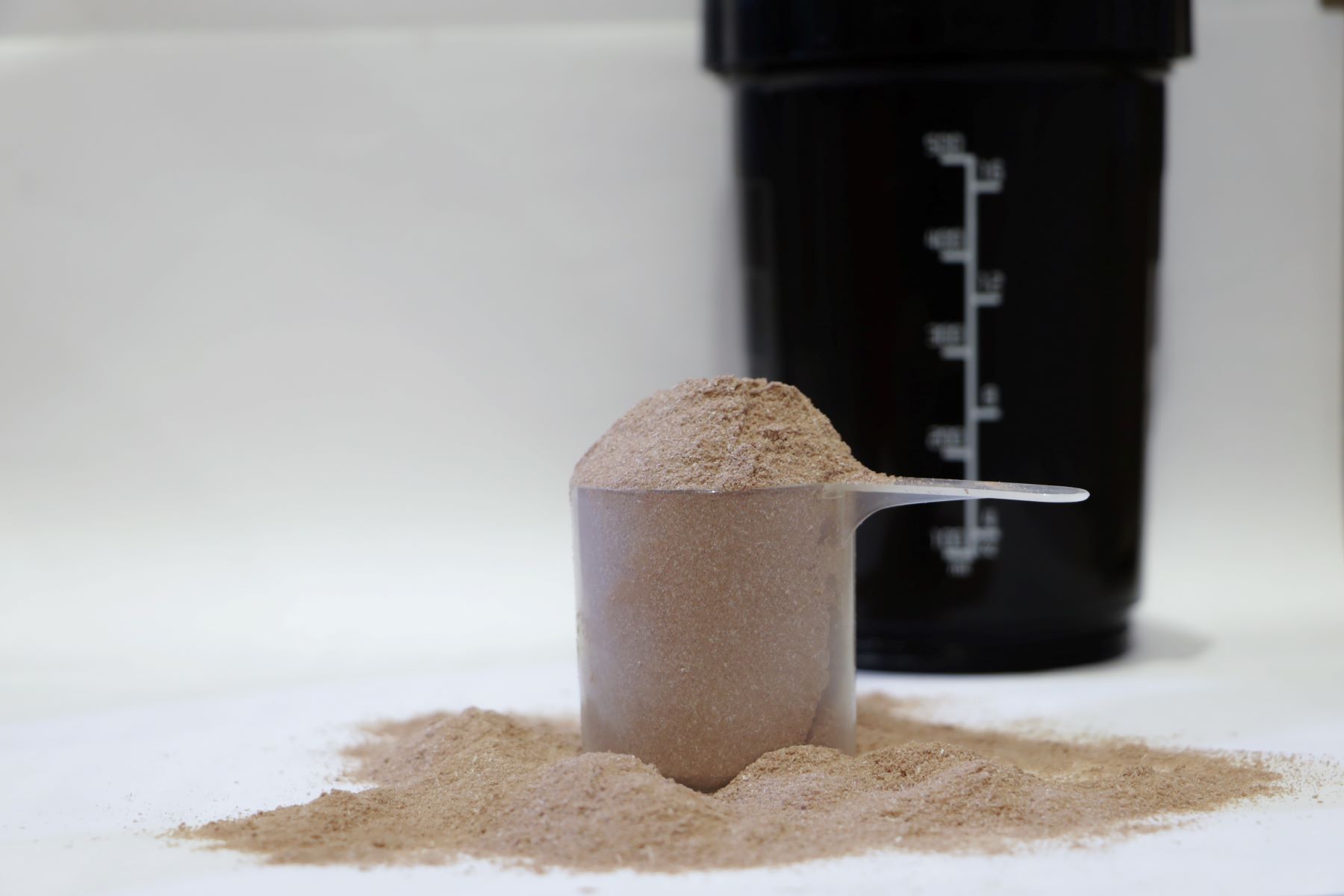Home>Misc>Featured>What Happens When You Take Too Much Pre-Workout


Featured
What Happens When You Take Too Much Pre-Workout
Modified: January 2, 2024
Discover the effects of taking too much pre-workout with our featured article. Learn about the potential risks and how to avoid them for a safe and effective workout experience.
Introduction
Pre-workout supplements have gained immense popularity in the fitness industry as a way to boost energy, endurance, and overall performance during workouts. These supplements typically contain a combination of ingredients, such as caffeine, creatine, beta-alanine, and nitric oxide boosters, that are designed to provide an extra kick to your training sessions.
However, it’s important to remember that when it comes to pre-workout supplements, moderation is key. While taking the recommended dosage can offer benefits, exceeding the recommended limit can have detrimental effects on your health and well-being. In this article, we’ll explore the dangers of taking too much pre-workout and the negative effects it can have on your body.
It’s understandable that you may be tempted to take more pre-workout in the hopes of experiencing even better results. After all, who doesn’t want to push themselves further and achieve greater gains? But exceeding the recommended dosage can do more harm than good. It’s crucial to understand the potential risks involved so that you can make informed decisions about your use of pre-workout supplements.
In the next sections, we’ll delve into the recommended dosage of pre-workout supplements and then discuss in detail the various dangers and negative effects associated with taking too much. From increased heart rate and blood pressure to digestive issues and sleep disturbances, we’ll cover it all.
So, if you’ve ever wondered what happens when you take too much pre-workout, keep reading to find out more.
Understanding Pre-Workout Supplements
Before we delve into the dangers of taking too much pre-workout, let’s first establish a clear understanding of what these supplements are and how they work.
Pre-workout supplements are specially formulated to provide a combination of ingredients that can enhance physical performance and mental focus during your workouts. They typically come in the form of powders or capsules that are mixed with water or other beverages and consumed about 30 minutes before exercise.
These supplements often contain key ingredients such as:
- Caffeine: A popular stimulant that helps increase energy levels, mental alertness, and focus.
- Creatine: A compound that enhances muscle strength and power by increasing the production of adenosine triphosphate (ATP).
- Beta-alanine: An amino acid that helps buffer lactic acid build-up in muscles, delaying fatigue and improving endurance.
- Nitric oxide boosters: Ingredients like L-arginine and citrulline that promote vasodilation, improving blood flow to muscles and enhancing nutrient and oxygen delivery.
When taken in the proper dosage, pre-workout supplements can provide a range of benefits, including increased energy, enhanced muscle pump, improved endurance, and heightened focus. These effects can help you push through challenging workouts and achieve your fitness goals.
However, it’s important to note that pre-workout supplements are not magic potions. They should be used as part of a well-rounded fitness routine that includes proper nutrition, hydration, and recovery. They are meant to complement your efforts, not replace them.
Additionally, not all pre-workout supplements are created equal. The quality, composition, and efficacy of these products can vary greatly from brand to brand. It’s essential to do thorough research and choose a reputable and trusted brand that uses high-quality ingredients and has positive customer feedback.
Now that we have a clear understanding of what pre-workout supplements are and their intended purpose, let’s explore the recommended dosage to ensure you get the most out of these products while staying safe and healthy.
Recommended Dosage of Pre-Workout Supplements
To experience the desired benefits of pre-workout supplements without putting your health at risk, it’s essential to follow the recommended dosage guidelines provided by the manufacturer. These guidelines are typically stated on the product label or packaging.
While specific dosages may vary depending on the brand and formula of the pre-workout supplement, there are general guidelines that can help you make informed decisions:
- Start with the lowest effective dose: When using a pre-workout supplement for the first time, it’s wise to start with the lowest recommended dose. This allows you to assess your tolerance to the product and gauge how it affects your body.
- Gradually increase if necessary: If the initial dose does not provide the desired effects, you can gradually increase the dosage as recommended by the manufacturer. It’s important to remember that more is not always better, and exceeding the recommended dosage can lead to adverse effects.
- Follow the time guidelines: Pay attention to the recommended timing for taking pre-workout supplements. Most products suggest consuming them approximately 30 minutes before a workout to allow enough time for the ingredients to exert their effects.
- Keep a gap between doses: It’s crucial to allow sufficient time between doses when using pre-workout supplements. Taking multiple doses within a short period or consuming other caffeine-rich products along with pre-workout supplements can increase the risk of side effects.
- Consider your individual needs: Every individual is different, so it’s essential to consider your own tolerance, sensitivity, and response to pre-workout supplements. Listen to your body and adjust the dosage accordingly.
By following these dosage recommendations, you can maximize the benefits of pre-workout supplements while minimizing the risk of adverse effects. It’s essential to note that excessive use of pre-workout supplements can lead to various negative consequences, which we will explore in the next section.
Now that we’ve covered the recommended dosage, let’s explore the potential dangers of taking too much pre-workout and the negative effects it can have on your body.
Dangers of Taking Too Much Pre-Workout
While pre-workout supplements can offer benefits when taken in moderation, exceeding the recommended dosage can have serious consequences on your health. It’s essential to be aware of the potential dangers and negative effects of taking too much pre-workout.
One of the primary concerns of overconsumption is the excessive intake of stimulants, particularly caffeine. Most pre-workout supplements contain caffeine as a key ingredient, which provides energy and focus. However, taking an excessive amount of caffeine can lead to a range of adverse effects.
One of the immediate dangers of consuming too much pre-workout is an increased heart rate and blood pressure. Excessive amounts of stimulants can put an immense strain on the cardiovascular system, potentially leading to heart palpitations, arrhythmias, and even heart attacks in extreme cases.
In addition to cardiovascular issues, overconsumption of pre-workout supplements can cause digestive issues and stomach upset. The ingredients in these supplements, such as beta-alanine and nitric oxide boosters, can lead to bloating, diarrhea, and gastrointestinal discomfort.
Dehydration and electrolyte imbalance are also concerns when taking excessive amounts of pre-workout. Some ingredients, like diuretics and vasodilators, can increase urine output and result in fluid loss. This, coupled with intense exercise, can lead to dehydration and an electrolyte imbalance, which can have detrimental effects on overall performance and health.
Another common side effect of taking too much pre-workout is insomnia and sleep disturbances. The high caffeine content can interfere with your sleep patterns, making it difficult to fall asleep or stay asleep, leading to restless nights and daytime fatigue.
Excessive intake of pre-workout supplements can also cause nervousness, anxiety, and agitation. The stimulatory effects of these products can push your body into an overactive state, heightening feelings of restlessness and unease.
Beyond these immediate effects, there are potential long-term health risks associated with the overuse of pre-workout supplements. Chronic excessive intake of stimulants can lead to adrenal fatigue, where the adrenal glands become exhausted and unable to produce hormones properly. This can have far-reaching consequences on hormonal balance, metabolism, and overall well-being.
It’s important to remember that everyone’s body reacts differently to pre-workout supplements, and individual sensitivities play a role in how the body responds. What may work well for one person may be excessive for another. It’s crucial to listen to your body, pay attention to any adverse effects, and adjust your pre-workout intake accordingly.
Now that we have explored the dangers and negative effects of taking too much pre-workout, it’s evident that moderation is key when using these supplements. In the next sections, we’ll dive deeper into the specific negative effects on the body, such as increased heart rate and blood pressure, digestive issues, dehydration, and sleep disturbances.
Negative Effects on the Body
When it comes to taking too much pre-workout, there are several negative effects that can impact the body in various ways. Excessive consumption of these supplements can lead to a range of undesirable outcomes.
One of the most significant concerns is the impact on cardiovascular health. Taking too much pre-workout can result in an increased heart rate and elevated blood pressure. The excessive stimulation from ingredients like caffeine can put excessive strain on the heart, potentially leading to heart palpitations, arrhythmias, and even cardiovascular emergencies.
Digestive issues and stomach upset are also common side effects when you take an excessive amount of pre-workout. Ingredients like beta-alanine and nitric oxide boosters can cause bloating, gas, and gastrointestinal discomfort. This can interfere with your workout performance and overall well-being.
Dehydration and electrolyte imbalance are other negative effects associated with overconsumption of pre-workout supplements. Some ingredients in these supplements, such as diuretics, can increase urine output and lead to fluid loss. Combined with intense exercise, this can result in dehydration and an imbalance of electrolytes, which are essential for proper muscle function and overall health.
Sleep disturbances and insomnia are also prevalent when taking too much pre-workout. The high caffeine content in these supplements can interfere with your natural sleep patterns, making it difficult to fall asleep or stay asleep. This lack of quality rest can lead to daytime fatigue and affect your overall well-being.
Additionally, excessive intake of pre-workout supplements can cause feelings of nervousness, anxiety, and agitation. The stimulatory effects of ingredients like caffeine can push your body into an overactive state, leading to restlessness and heightened feelings of unease.
While these immediate effects can be concerning, there are also potential long-term health risks associated with chronic overuse of pre-workout supplements. Adrenal fatigue is a significant concern, where the adrenal glands become overworked and unable to produce hormones properly. This can disrupt hormonal balance, metabolism, and overall well-being.
It’s important to be aware of these negative effects and to approach the use of pre-workout supplements with caution. Moderation is crucial, and it’s essential to listen to your body and adjust your intake accordingly. What works for one person may not work for another, so it’s vital to understand your own sensitivities and tolerance levels.
In the next sections, we will explore the specific negative effects on the body in more detail, including increased heart rate and blood pressure, digestive issues and stomach upset, dehydration and electrolyte imbalance, sleep disturbances, and feelings of nervousness, anxiety, and agitation.
Increased Heart Rate and Blood Pressure
One of the immediate negative effects of taking too much pre-workout is an increase in heart rate and elevated blood pressure. Many pre-workout supplements contain stimulants like caffeine, which can have significant impacts on cardiovascular health.
When consumed in excessive amounts, stimulants can put excessive strain on the heart, leading to an elevated heart rate. This can manifest as heart palpitations, where you feel your heart beating rapidly or irregularly. While some mild heart palpitations can be relatively harmless, more severe cases can be alarming and even dangerous.
Elevated blood pressure is another concern associated with excessive intake of pre-workout supplements. Stimulants like caffeine can cause blood vessels to constrict, leading to an increase in blood pressure. Over time, consistently high blood pressure can have detrimental effects on cardiovascular health, contributing to conditions like hypertension and increasing the risk of heart disease and stroke.
Individuals with pre-existing cardiovascular conditions, such as high blood pressure or heart conditions, should be especially cautious when considering pre-workout supplements. The stimulatory effects can exacerbate these conditions and potentially lead to serious health complications.
It’s important to note that not everyone will experience the same degree of heart rate and blood pressure elevation when consuming pre-workout supplements. Individual tolerances to stimulants can vary, and factors like overall health, sensitivity to caffeine, and other medications or supplements being taken can all play a role.
To mitigate the risks associated with increased heart rate and blood pressure, it’s crucial to stick to the recommended dosage of pre-workout supplements. Going overboard and taking excessive amounts can lead to severe cardiovascular effects that may have long-lasting consequences.
If you’re concerned about the impact of pre-workout supplements on your cardiovascular health, it’s always a good idea to consult with a healthcare professional. They can assess your individual circumstances, provide guidance, and help you make informed decisions about supplement usage.
In the next sections, we will explore other negative effects of taking too much pre-workout, including digestive issues and stomach upset, dehydration and electrolyte imbalance, sleep disturbances, and feelings of nervousness, anxiety, and agitation.
Digestive Issues and Stomach Upset
An unfortunate side effect of taking excessive amounts of pre-workout supplements is the onset of digestive issues and stomach upset. The combination of ingredients in these supplements, particularly beta-alanine and nitric oxide boosters, can lead to gastrointestinal discomfort.
Beta-alanine, a common ingredient in pre-workout supplements, can cause a tingling or “pins and needles” sensation known as paresthesia. While this sensation is generally harmless, it can be uncomfortable for some individuals, particularly when taken in high doses.
Nitric oxide boosters, often included in pre-workout formulas, are known for promoting vasodilation, improving blood flow to muscles. However, they can also cause bloating, gas, and other digestive issues. The expansion of blood vessels can lead to increased blood flow to the digestive system, resulting in an increased risk of gastrointestinal discomfort.
Furthermore, the combination of intense exercise and certain ingredients in pre-workout supplements can potentially cause stomach upset and gastrointestinal distress. These symptoms may include nausea, vomiting, abdominal pain, and diarrhea.
It’s important to note that not everyone will experience digestive issues and stomach upset when taking pre-workout supplements. Sensitivities and individual tolerance to specific ingredients can vary. Some individuals may be more prone to gastrointestinal discomfort, while others may not experience any issues at all. However, taking excessive amounts of pre-workout supplements can significantly increase the likelihood of experiencing these negative effects.
To minimize the risk of digestive issues and stomach upset, it’s crucial to follow the recommended dosage guidelines provided by the supplement manufacturer. Starting with the lowest effective dose and gradually increasing if necessary can help assess tolerance and minimize the risk of adverse gastrointestinal reactions.
If you are prone to digestive issues or have a sensitive stomach, it’s advisable to choose pre-workout supplements that have been formulated to be gentle on the digestive system. Additionally, maintaining proper hydration and avoiding high-fat or heavy meals before taking pre-workout can help reduce the likelihood of experiencing stomach upset.
In the next sections, we will explore other negative effects of taking too much pre-workout, including the risks of dehydration and electrolyte imbalance, sleep disturbances, and feelings of nervousness, anxiety, and agitation.
Dehydration and Electrolyte Imbalance
When taking excessive amounts of pre-workout supplements, one of the negative effects that can arise is dehydration and electrolyte imbalance. This is particularly true for individuals who engage in intense exercise while consuming these supplements.
Some pre-workout formulas contain ingredients like diuretics or other compounds that increase urine output. This can lead to a higher risk of dehydration, especially if you do not adequately replenish fluids during your workout.
Dehydration occurs when your body loses more fluids than it takes in, leading to an imbalance between water intake and water expenditure. When coupled with intense physical activity, sweating increases, further contributing to fluid loss. This can result in symptoms such as thirst, dry mouth, decreased urine output, fatigue, and dizziness.
In addition to fluid loss, excessive use of pre-workout supplements can disrupt the balance of electrolytes in the body. Electrolytes, such as sodium, potassium, calcium, and magnesium, play essential roles in maintaining proper muscle function, nerve transmission, and fluid balance.
Electrolyte imbalance can occur when fluid and electrolyte losses are not adequately replenished. This can lead to symptoms such as muscle weakness, cramping, fatigue, and in severe cases, even cardiac irregularities.
To mitigate the risk of dehydration and electrolyte imbalance, it is crucial to stay properly hydrated before, during, and after your workout. This includes consuming enough water and electrolyte-rich fluids to compensate for the increased fluid losses during exercise.
It’s important to note that consuming excessive amounts of water without replenishing electrolytes can also disrupt the electrolyte balance. Therefore, it is recommended to consume fluids that contain electrolytes or include foods in your post-workout nutrition that are rich in electrolytes, such as bananas, oranges, or coconut water.
Furthermore, paying attention to the signs of dehydration and electrolyte imbalance and adjusting your pre-workout supplement intake accordingly is crucial. If you notice symptoms such as excessive thirst, dark urine, muscle cramps, or dizziness, it may be an indication that you need to reevaluate your hydration strategy and supplement usage.
In the following sections, we will explore other negative effects of taking too much pre-workout, including sleep disturbances, and feelings of nervousness, anxiety, and agitation.
Insomnia and Sleep Disturbances
Taking excessive amounts of pre-workout supplements can disrupt your sleep patterns and lead to insomnia and sleep disturbances. This is primarily due to the high caffeine content in many pre-workout formulas, which acts as a stimulant on the central nervous system.
Caffeine promotes wakefulness and alertness by inhibiting the action of adenosine, a neurotransmitter that promotes drowsiness. By blocking adenosine receptors in the brain, caffeine can delay the onset of sleep and reduce the overall quality of sleep.
When consumed in excessive amounts or too close to bedtime, the stimulatory effects of caffeine can interfere with your ability to fall asleep. This can result in difficulty in initiating sleep, tossing and turning, and restlessness during the night.
In addition to caffeine, other stimulants found in pre-workout supplements, such as beta-alanine and other energy-boosting ingredients, can also contribute to sleep disturbances. The heightened state of alertness and increased energy levels can make it challenging to wind down and relax, further impacting the quality of sleep.
Consistently experiencing sleep disturbances can have a detrimental impact on your overall health and well-being. Lack of sleep can lead to daytime fatigue, lower cognitive function, and impaired workout performance. It can also impact your mood, ability to recover from exercise, and overall ability to function optimally.
To minimize the risk of sleep disturbances and insomnia, it’s important to be mindful of the timing and dosage of pre-workout supplements. It’s generally recommended to avoid consuming pre-workout supplements within six hours of bedtime to allow the stimulants to metabolize and their effects to wear off before attempting to sleep.
Additionally, if you are someone who is particularly sensitive to caffeine or prone to sleep disturbances, you may want to consider choosing pre-workout supplements that have a lower caffeine content or opting for caffeine-free alternatives.
Evaluating your individual tolerance and response to pre-workout supplements is essential. If you find that your sleep is consistently disrupted even with mindful timing and dosage, it may be necessary to reevaluate your use of pre-workout supplements or seek advice from a healthcare professional.
In the next section, we will explore the negative effects of taking too much pre-workout, focusing on feelings of nervousness, anxiety, and agitation.
Nervousness, Anxiety, and Agitation
One of the negative effects of taking excessive amounts of pre-workout supplements is the onset of nervousness, anxiety, and agitation. These stimulatory effects are primarily attributed to the presence of ingredients like caffeine, beta-alanine, and other energy-boosting compounds.
Caffeine, a central nervous system stimulant, can increase alertness and arousal. While this can be advantageous during a workout, consuming too much caffeine can lead to heightened feelings of nervousness and anxiety. The stimulant properties of caffeine can amplify the body’s stress response, causing restlessness and a sense of unease.
Beta-alanine, another common ingredient in pre-workout supplements, can also contribute to feelings of anxiety and agitation. This amino acid works by buffering the build-up of lactic acid in muscles, delaying fatigue. However, for some individuals, high doses of beta-alanine can cause tingling sensations and heightened anxiety.
Excessive consumption of pre-workout supplements can push your body into an overactive state, exacerbating feelings of nervousness, anxiety, and agitation. The combination of caffeine, beta-alanine, and other stimulants can induce an intense physiological response that may be overwhelming for some individuals.
Studies have shown that individuals who are already predisposed to anxiety or have underlying anxiety disorders may be more susceptible to experiencing these negative effects. Furthermore, the timing and duration of the stimulant effects can vary between individuals, so what might be tolerable for one person may be overwhelming for another.
If you find yourself experiencing excessive nervousness, anxiety, or agitation after taking pre-workout supplements, it’s important to reassess your intake and consider adjusting the dosage or exploring alternative options. Pay attention to how your body responds and listen to any signs of discomfort or unease.
It’s worth noting that the negative effects on mood and mental well-being may not be limited to the immediate post-workout period. The stimulatory effects of pre-workout supplements can extend beyond the workout session, potentially affecting your overall daily functioning and well-being.
If you have a history of anxiety or are concerned about the impact of pre-workout supplements on your mental health, it may be beneficial to consult with a healthcare professional. They can provide guidance, evaluate your individual circumstances, and offer recommendations tailored to your specific needs.
In the final section, we will briefly summarize the potential long-term health risks associated with excessive pre-workout supplement usage.
Potential Long-term Health Risks
While the immediate negative effects of taking too much pre-workout are concerning, there are also potential long-term health risks associated with excessive usage. Chronic overconsumption of pre-workout supplements can have far-reaching consequences on your overall health and well-being.
One of the primary concerns is the risk of adrenal fatigue. The adrenal glands are responsible for producing hormones, including cortisol, which helps regulate metabolism, stress response, and immune function. Prolonged and excessive stimulation from pre-workout supplements can lead to the overactivity and exhaustion of the adrenal glands, a condition known as adrenal fatigue.
Adrenal fatigue can disrupt the delicate balance of hormones in the body, potentially leading to symptoms such as fatigue, weight gain or loss, weakened immune function, and hormonal imbalances. It can also impact overall energy levels, mood stability, and the body’s ability to handle stress.
Moreover, chronic overuse of pre-workout supplements that contain high doses of caffeine can contribute to caffeine dependency. Your body can develop a tolerance to the stimulant effects, requiring increasingly higher amounts to achieve the desired results. This can lead to a cycle of dependency, affecting your ability to function without the supplement and potentially leading to withdrawal symptoms when attempting to reduce or stop usage.
Furthermore, long-term excessive intake of stimulants found in pre-workout supplements can affect sleep patterns and disrupt the body’s natural circadian rhythm. Consistently experiencing sleep disturbances can have detrimental effects on overall health, including increased risk of cardiovascular disease, weakened immune function, and impaired cognitive performance.
The potential long-term health risks associated with pre-workout supplement usage highlight the importance of moderation and responsible use. It’s crucial to consider the long-term impact on your health and to prioritize overall well-being over short-term gains.
If you have concerns about the impact of pre-workout supplements on your health or have a pre-existing medical condition, it’s wise to consult with a healthcare professional. They can provide personalized guidance, assess your individual circumstances, and help you make informed decisions about your supplement usage.
In summary, while pre-workout supplements can offer benefits when used in moderation, excessive intake can lead to potential long-term health risks. It’s essential to be aware of the potential consequences and make informed choices to maintain your well-being and achieve your fitness goals safely.
Conclusion
Pre-workout supplements can be useful tools for enhancing energy, focus, and performance during workouts. However, it’s crucial to approach their usage with caution and moderation to minimize potential risks and negative effects.
Understanding the recommended dosage is essential to ensure you’re getting the maximum benefits without putting your health at risk. Starting with the lowest effective dose and gradually increasing, if necessary, allows you to gauge your tolerance and response to the supplement.
Excessive intake of pre-workout supplements can lead to a range of negative effects on the body. Increased heart rate and blood pressure, digestive issues and stomach upset, dehydration and electrolyte imbalance, sleep disturbances, and feelings of nervousness, anxiety, and agitation are some examples of these detrimental effects.
Chronic overuse of pre-workout supplements can also result in potential long-term health risks. Adrenal fatigue, caffeine dependency, and disruptions to sleep patterns can have far-reaching consequences on overall health and well-being.
Moderation and responsible usage are key when it comes to pre-workout supplements. It’s essential to listen to your body, pay attention to any adverse effects, and adjust your intake accordingly. If you have any concerns or underlying health conditions, consulting with a healthcare professional can provide valuable guidance.
Ultimately, maintaining a well-rounded approach to fitness that includes proper nutrition, hydration, rest, and recovery is crucial for achieving optimal results. Pre-workout supplements should be seen as a complement to a balanced lifestyle, rather than a magic solution.
By understanding the risks and benefits, you can make informed decisions about pre-workout supplement usage to support your fitness goals while prioritizing your long-term health and well-being.









